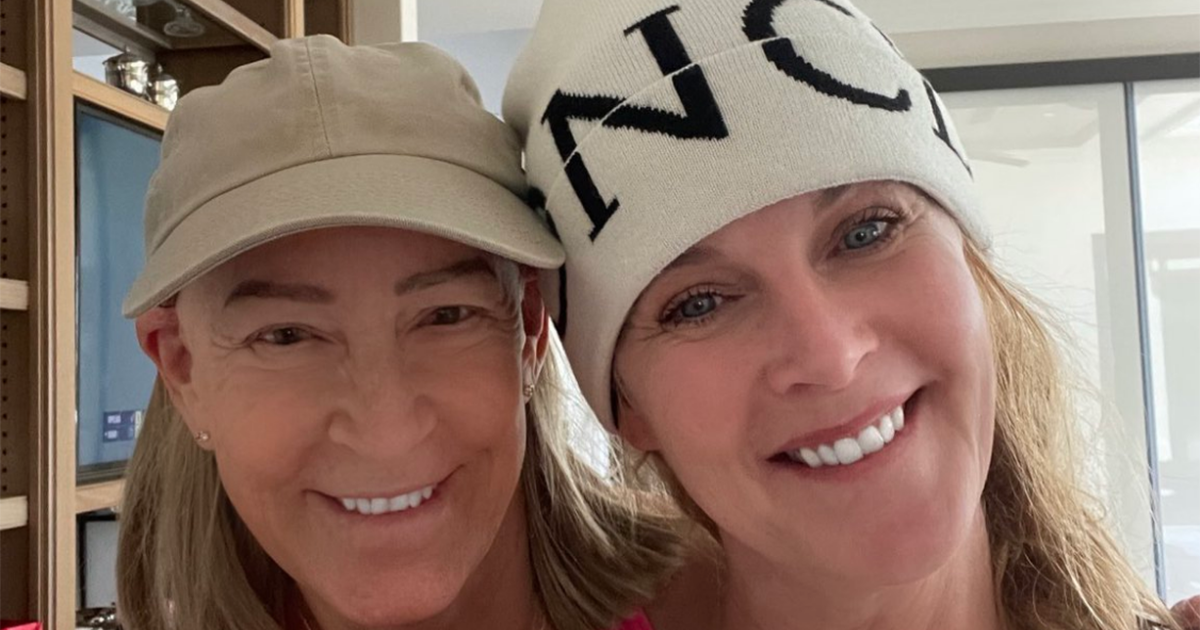Chemotherapy Side Effect: Hair Loss
- Chris Evert, the tennis legend from Fort Lauderdale, Fla., who recently finished chemotherapy for ovarian cancer, "can't wait" for her eyelashes to grow back!
- Earlier this month, Evert, 67, shared the exciting news that she had completed her sixth and final chemotherapy treatment for stage 1 ovarian cancer.
- There are quite a few side effects that come along with chemotherapy treatment; one of the most common, and dreaded, is hair loss.
Earlier this month, Evert, 67, shared the exciting news that she had completed her sixth and final chemotherapy treatment for stage 1 ovarian cancer.
Read MoreI'm a little out of it ( meds) but nonetheless, thankful and relieved I finished my 6 chemo treatments .ðŸ™ðŸ™ðŸ™ pic.twitter.com/awKOpFdbNk
Chris Evert (@ChrissieEvert) May 9, 2022
Her friend, 57-year-old actress Maeve Quinlan, congratulated Evert on her amazing achievement on Twitter earlier this week.
"Guess who I just got home from visiting & who is doing AHhhhh-Mazing since her final round of chemo??? This Girl @ChrissieEvert," Quinlan shared on social media along with a photo of herself and Evert. "So proud of you Chrissie!!!!"
Evert shared the tweet, thanking Quinlan for her support and friendship, adding, "Can't wait for my eyelashes to grow back…"
Love ya @maevequinlan Your support and friendship mean the world to me. Can't wait for my eyelashes to grow back…🤦â€â™€ï¸ðŸ§ https://t.co/Z14f7NL66J
Chris Evert (@ChrissieEvert) May 24, 2022
Chemotherapy Side Effect: Hair Loss
There are quite a few side effects that come along with chemotherapy treatment; one of the most common, and dreaded, is hair loss. Other side effects of chemotherapy can include nausea, constipation and neuropathy.
"It's one of the things that people can see from the outside that people may know that you are ill," Vivian Ruszkiewicz, a nurse practitioner with OhioHealth, a not-for-profit system of hospitals and health care providers in Columbus, Ohio, previously told SurvivorNet, "and that poses a lot of stress for patients."
Chemotherapy Side Effects Hair Loss
There are a large number of chemotherapy treatments that cause hair loss, but not all of them, she added. Others cause hair thinning. (If you’re concerned about your hair, talk to your doctor or nurse practitioner about what to expect from your chemotherapy treatment.)
Ruszkiewicz said that some people who only experience partial hair loss still choose to wear a wig, like many people who lose their hair completely, before chemotherapy so that they’re prepared and "can feel more like themselves during chemotherapy." (It’s also possible for patients, like Chris Evert, to lose their eyelashes and eyebrows.)
Then there are others who choose to embrace their hair loss and shave their head before the balding even begins!
She added that hair loss begins about three to four weeks after your first chemotherapy treatment; you could start to see some hair regrowth about four to six weeks after your last treatment.
"Then it will kind of continue from there, as long as you aren't being treated with another medication that might cause hair loss," she added. "But in general, most people do have a resumption of hair growth, and can slowly over time put away their wigs and scarves, and are able to kind of go back to what they expected in terms of their hair growth."
In other words, remember that hair loss is temporary!
Chris Evert's Cancer Diagnosis
Chris Evert shared the news of her ovarian cancer diagnosis in an ESPN article published earlier this year. Her diagnosis and what it took to get there was described in vivid detail.
Her story is unfortunately not an uncommon one, but it has a more positive outcome than most ovarian cancer patients because the disease is often caught too late. In Evert's case, she is just stage 1.

When speaking about Evert's case specifically, world-renowned gynecological oncologist Dr. Beth Karlan of UCLA Health told SurvivorNet, "When she found out, at age 67, that her sister had this mutation (BRCA1), she got tested, found she had it too, acted on it, had the prophylactic surgery, and serendipitously was found to have a very early and likely curable ovarian cancer."
However, that wasn’t the case for Evert's younger sister, Jeanne Evert Dubin, who was also a professional tennis player. Dubin died from advanced-stage ovarian cancer in February 2020. She was 62 years old.
When Dubin was diagnosed with cancer, it was in its later stage, and it had spread. That is often the case with ovarian cancer, many SurvivorNet experts have told us. Ovarian cancer is almost impossible to diagnose early like in Evert's case because women don’t begin to show symptoms until the disease has reached its later stage. There are also no routine screening tests recommended for women who are at an average risk for ovarian cancer.
How did Evert catch her ovarian cancer so early? She found out she had the BRCA1 gene mutation and began to get regular cancer screenings.
The BRCA1 (BReast CAncer 1) or BRCA2 (BReast CAncer 2) genes help cells repair their DNA damage. Having a change, or mutation, in one of these genes increases a woman's risk of developing ovarian and breast cancer. These gene mutations are commonly passed down in families. If a parent carries a BRCA gene mutation, there’s a 50-50 chance you could be carrying it as well.
When Dubin, Chris Evert's sister, was going through cancer treatment, she had tested negative for the BRCA1 gene. Because of this, her family members, including Evert, weren’t encouraged to seek genetic testing themselves.
However, it was later proven that Dubin did in fact have the pathogenic BRCA1 gene, which increased her chances of developing ovarian cancer. This prompted Evert to "immediately" send her blood in for genetic testing, which revealed she also had the pathogenic variant of the BRCA1 gene. (Gene mutations can either be benign or pathogenic.)
Due to her increased risk of developing ovarian cancer, Evert decided in collaboration with her doctor to have a hysterectomy, which is a surgical procedure to remove the uterus. She had this procedure done first as her sister died from a type of gynecological cancer, but a mastectomy surgery that removes the entire breast was planned for later down the line as BRCA1 can also increase a woman's chances of developing breast cancer.
But a proactive measure Evert's hysterectomy turned out to be a necessary step in her own cancer journey, as pathology following her surgery revealed malignant cells and a tumor originating in Evert's left fallopian tube.
Learn more about SurvivorNet's rigorous medical review process.


